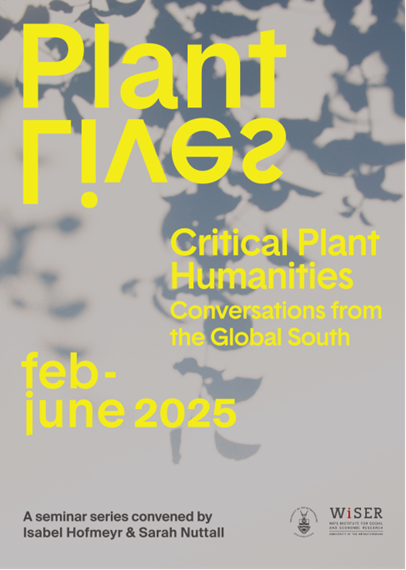New Seminar Series 2025: Plant Lives - Critical Plant Humanities - Conversations from the Global South
WiSER is proud to announce a new online seminar series Plant Lives: Critical Plant Humanities - Conversations from the Global South.
It follows on from two successful series "Heated Conversations" and "Breathing In: Air and Atmospheres".
 Plant Lives
Plant Lives
Critical Plant Humanities – Conversations from the Global South
A new seminar series convened by Isabel Hofmeyr and Sarah Nuttall
February to June 2025
In these calamitous times, are plants a distraction from pressing problems, or a new way to approach them? Is the burgeoning field of the plant humanities just another fad with little bearing on the global south? Can we imagine a seedy and weedy politics in which plants are less metaphors for human logics and more themselves? Can we shift from an abstract concern with plant life to consider material plant lives? And if so, with what consequences?
This seminar series explores the global plant humanities and the conversations that plant worlds enable. We envisage a postcolonial plantarium* which encompasses plantations, pre-colonial pharmacopoeias, philosophy, phytopoetics (both visual and textual) and much more. Our starting point is 'ruderal', a term which describes a plant that grows in disturbed grounds. A plant humanities for the global south take shapes at the intersection of enforced human and plant migrations and works in the wake of disturbance and damage.
The seminar series will run on Mondays from 4-5pm SAST. Papers will be sent a week beforehand.
Dates: February 17, 24; March 3, 10, 17, 24; April 7, 14; May 5, 12, 19, 26; June 2
Speakers: Yota Batsaki, Luciano Concheiro San Vicente, Stephané Conradie, Isabel Hofmeyr, Anna Lawrence, Nox Makunga, Molemo Moiloa and Nare Mokgotho, Haripriya Rangan, Sumana Roy, Ruth Sacks, Riley Snorton, Banu Subramaniam,Luvuyo Wotshela
*Thanks to Marianna Szczygielska and Olga Cielemęcka for this term
